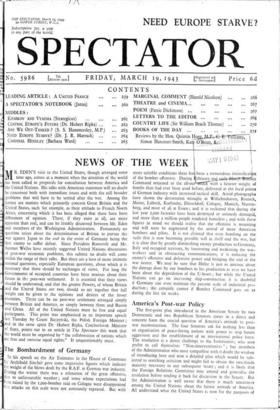The Bombardment of Germany
In his speech on the Air Estimates in the House of Commons Sir Archibald Sinclair gave some impressive figures which indicate the weight of the blows dealt by the R.A.F. at German war industry. During the winter there was a relaxation of the great offensive, due to unfavourable weather ; and some whose expectations had een raised by the i,000-bomber raid on Cologne were disappointed hit attacks on this scale were not constantly repeated. But with more suitable conditions there ha been a tremendous intensificat i n of the bomber offensive. During • ebruar a
Command returned to the all-ou with a heavier weight of bombs than had ever been used before, delivered at the focal points of German industry with increased tactical skill. Aerial photographs have shown the devastation wrought at Wilhelmshaven, Rostock, Mainz, Lubeck, Karlsruhe, Diisseldorf, Cologne, Munich, Nurem- berg, and most of all at Essen ; and it is reckoned that during the last year 2,000 factories have been destroyed or seriously damaged, and more than a million people rendered homeless ; and with these figures in mind we should realise that the offensive is mounting and will soon be augmented by the arrival of more American bombers and pilots. It is not claimed that even bombing on the scale that is now becoming possible will in itself end the war, but it is clear that by greatly diminishing enemy production in Germany, Italy and occupied territory, by frustrating and weakening the war- workers and in obstructing communications, it is reducing the enemy's offensive and defensive power and bringing the end of the war nearer. We may be sure that Hitler is just as anxious about the damage done by our bombers to his production as ever we have been about the depredation of the U-boats ; but while the United Nations can go on increasing ship-construction it is doubtful if Germany can even maintain the present scale of industrial pro- duction ; she certainly cannot if Bomber Command goes on as during the last six weeks.


























